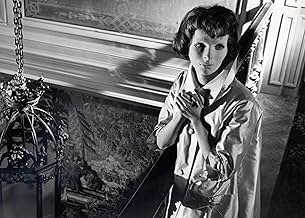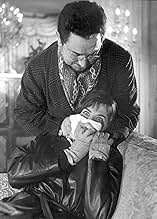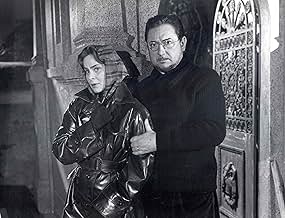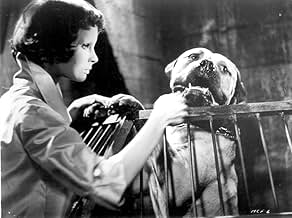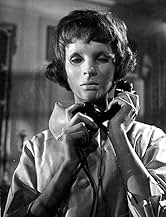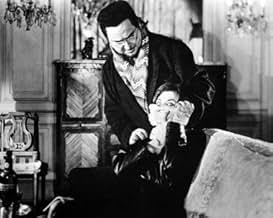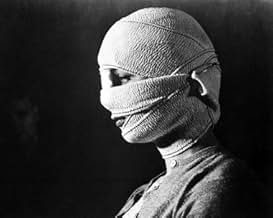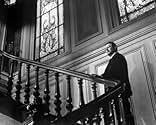ÉVALUATION IMDb
7,6/10
37 k
MA NOTE
Un chirurgien provoque un accident qui a défiguré sa fille et va jusqu'à l'extrême pour lui donner un nouveau visage.Un chirurgien provoque un accident qui a défiguré sa fille et va jusqu'à l'extrême pour lui donner un nouveau visage.Un chirurgien provoque un accident qui a défiguré sa fille et va jusqu'à l'extrême pour lui donner un nouveau visage.
Charles Blavette
- L'homme de la fourrière
- (scenes deleted)
- (as Blavette)
Charles Bayard
- Un homme à la conférence
- (uncredited)
Avis en vedette
"Eyes Without A Face" is a groundbreaking and trendsetting artistic nightmare! The plot of this film has often been copied but never has it been done in such an eerily effective style. The sight of the masked daughter playing with the dogs evokes many emotions in the viewer. There are shots in this movie that will stay with you long after you have seen it! Heavily recommended!
This film is dark and somber with a spare, eerie music score that suits perfectly the macabre, surreal story. A brilliant but deranged surgeon, having caused his daughter's disfigurement in a car accident, loses touch with reality and tries to restore her beauty in a most repulsive manner. Undeterred by failure, the mad doctor continues his gruesome work, hoping to find a miracle cure that will reconstruct the girl's facial features and also relieve him of his tremendous burden of guilt. The once-lovely girl realizes that she will never enjoy a normal life or see her beloved fiancé again, and her mute telephone calls to him just to hear his voice show how empty and lonely her life has become. There are some scenes that are horribly graphic but quite well done and a few moments that are poignant and touching amid the cruelty and butchery of the movie's central theme. Each character in this grim, unhappy feature is victimized in some fashion, but in spite of its subject matter, this cult classic is lean, first-rate storytelling.
Yes, in case you were wondering, Billy Idol's iconic 80s creepy-ballad "Eyes Without a Face" was directly influenced by this film (the haunting female vocals in the chorus are singing "les yeux sans visage", something I never noticed until I googled the lyrics just now). And this isn't just a passing association I'm mentioning for the sake of getting the attention of any 80s music fans out there; it actually relates to why this is such a great creepy-ballad of a film.
"Les yeux sans visage" is only the 2nd feature film of director Georges Franju, but already he showed an absolute mastery of the craft, if not the creation of a whole new genre. This is broadly a horror story, but it's a horror story in the same sense that 2001: A Space Odyssey is a scifi flick. That is, it uses a certain fantasy genre but only as a backdrop to tell a deeper, universal, timeless story about the human condition. In particular, here we focus on the striking contrast between beauty and cruelty. And when I say "cruelty" I don't mean some cartoonish villain with a handlebar mustache cackling as he ties women to railroad tracks. No, here the "cruelty" is scientific, emotionless and in the literal sense of the word: amoral.
Our villain "The Professor" (who doesn't have a handlebar mustache but is sporting a very Satanic goatee) is excellently played by Pierre Brasseur as a man who has no emotions. He has neither malice nor benevolence, even though on the surface we want to interpret his actions as such. We assume there's malice because he abducts and does nasty things to pretty young women for his medical experiments. We assume an ironic wisp of benevolence because these experiments are presumably to save the person closest to him, his daughter. But neither assumption is correct. The Professor is pure, unemotional science ("intellect"). He is intelligence without a heart. Balancing this character wonderfully is his daughter who is at first equally amoral--literally without morals like a newborn child--but with a strong, tender, emotional side ("soul") and an inclination to learn and evolve. What we get is a painful and beautiful contrast between the intellect and the soul.
Which brings me to the soul half of the equation, and this is what elevates this far above and beyond any horror flick I've ever seen. The daughter is played by newcomer Edith Scob who spends half the film hiding behind a mask but whose graceful charms transcend facial expressions. Almost like a ballet dancer, she uses her body gracefully to convey every feeling we need to know. In fact it's her lack of facial expression that forces us to focus on her body language: movement and form instead. Further highlighting this expression of the human form, we get excellent cinematography, lighting, wardrobe (notice how she is dressed like a human doll) and ESPECIALLY the magical soundtrack giving her a themesong that sounds almost like a music box playing a lullaby.
This brings me back to Billy Idol. You thought I forgot. Billy Idol's 1983 "Eyes Without a Face" was a soft, melodic lullaby ballad but with a very menacing edge to the lyrics and instrumentation when the guitars kick in. Just like this film does, it contrasted cruelty against beauty, something which hadn't been explored much in 80s pop music--as well as 50s/60s horror flicks.
I have to admit, the first time I watched this movie I didn't really appreciate it the way I should have, much like the first time I heard Billy Idol's tune on the radio. But maybe this review has given you a head start; if you watch this film, keep this stuff in mind and maybe you'll appreciate it right away. "Les yeux sans visage" is not a horror story nor is it a battle between good vs evil. It's a study of beauty vs cruelty, both presented in the vacuum of amorality. This film defies all genres. I guess you could say you can't quite put a face to it. Ha. Seriously folks, you'll never forget it. (Get it? Never forget a FACE). Ok enough lame puns. I'll just close by mentioning that Edith Scob is gorgeous. Her face is really easy on the eyes.
"Les yeux sans visage" is only the 2nd feature film of director Georges Franju, but already he showed an absolute mastery of the craft, if not the creation of a whole new genre. This is broadly a horror story, but it's a horror story in the same sense that 2001: A Space Odyssey is a scifi flick. That is, it uses a certain fantasy genre but only as a backdrop to tell a deeper, universal, timeless story about the human condition. In particular, here we focus on the striking contrast between beauty and cruelty. And when I say "cruelty" I don't mean some cartoonish villain with a handlebar mustache cackling as he ties women to railroad tracks. No, here the "cruelty" is scientific, emotionless and in the literal sense of the word: amoral.
Our villain "The Professor" (who doesn't have a handlebar mustache but is sporting a very Satanic goatee) is excellently played by Pierre Brasseur as a man who has no emotions. He has neither malice nor benevolence, even though on the surface we want to interpret his actions as such. We assume there's malice because he abducts and does nasty things to pretty young women for his medical experiments. We assume an ironic wisp of benevolence because these experiments are presumably to save the person closest to him, his daughter. But neither assumption is correct. The Professor is pure, unemotional science ("intellect"). He is intelligence without a heart. Balancing this character wonderfully is his daughter who is at first equally amoral--literally without morals like a newborn child--but with a strong, tender, emotional side ("soul") and an inclination to learn and evolve. What we get is a painful and beautiful contrast between the intellect and the soul.
Which brings me to the soul half of the equation, and this is what elevates this far above and beyond any horror flick I've ever seen. The daughter is played by newcomer Edith Scob who spends half the film hiding behind a mask but whose graceful charms transcend facial expressions. Almost like a ballet dancer, she uses her body gracefully to convey every feeling we need to know. In fact it's her lack of facial expression that forces us to focus on her body language: movement and form instead. Further highlighting this expression of the human form, we get excellent cinematography, lighting, wardrobe (notice how she is dressed like a human doll) and ESPECIALLY the magical soundtrack giving her a themesong that sounds almost like a music box playing a lullaby.
This brings me back to Billy Idol. You thought I forgot. Billy Idol's 1983 "Eyes Without a Face" was a soft, melodic lullaby ballad but with a very menacing edge to the lyrics and instrumentation when the guitars kick in. Just like this film does, it contrasted cruelty against beauty, something which hadn't been explored much in 80s pop music--as well as 50s/60s horror flicks.
I have to admit, the first time I watched this movie I didn't really appreciate it the way I should have, much like the first time I heard Billy Idol's tune on the radio. But maybe this review has given you a head start; if you watch this film, keep this stuff in mind and maybe you'll appreciate it right away. "Les yeux sans visage" is not a horror story nor is it a battle between good vs evil. It's a study of beauty vs cruelty, both presented in the vacuum of amorality. This film defies all genres. I guess you could say you can't quite put a face to it. Ha. Seriously folks, you'll never forget it. (Get it? Never forget a FACE). Ok enough lame puns. I'll just close by mentioning that Edith Scob is gorgeous. Her face is really easy on the eyes.
Georges Franju's atmospheric masterpiece is a tapestry of contradictions. Eyes Without a Face is a compelling tale of sadism that has an astute tenderness at the same time. A film that will disgust you with it's macabre imagery, yet simultaneously mesmerise you with it's beauty; a seething tale of love, fashioned by extreme guilt. Through the Gothic confines of a grandiose mansion, Franju has taken ideas from classic stories such as 'Frankenstein' and constructed a dream like surrealistic fantasy that has inspired legions of filmmakers since: from obvious inspirations like Jess Franco's The Awful Dr Orlof, all the way to the full blown Hollywood action fest, Face/Off; Eyes Without a Face stands out as one of cinema's most important, yet most overlooked films. The central story is a deliriously simple tale of vanity, guilt and redemption; yet one that is lent a great depth from it's cast of central characters. Doctor Génessier, guilt ridden over a car accident that left his beloved daughter, Christiane, with a destroyed face uses his assistant to kidnap young girls in an attempt to reconstruct her ruined features. The good doctor peels the faces from his victims and grafts them over the ruined features of his young daughter. However, the experiments are a continual failure but, motivated by a strong sense of guilt, Doctor Génessier must keep trying.
The doctor himself is a masterpiece of horror film villainy. Unlike many mad scientists since, the doctor here is firmly placed within reality which makes his motivations easy to believe and therefore the horror all the more fascinating. He is supported by his assistant, Louise; a fellow web of intrigue. Louise isn't the normal mad doctor's assistant; she isn't deformed, or demented but rather a cunning, malevolent and cerebral predator; gathering her victims to aid the doctor's latest experiment. The real masterpiece of characterisation, however, comes from the central character; the disfigured tragedy herself, Christiane. The scenes that see her float around in her mask gown are some of the most memorable ever brought to the screen. While wearing her mask, Christiane represents both life and death. The mask itself is stagnant and lifeless, but the eyes beneath the mask are full of life's beauty, giving the young girl a surrealistic look that epitomises the film in that it's hard to place; is it beautiful, or revolting; good or evil?
This film is a rare treat in that it's actually frightening. Eyes Without a Face taps into the viewer's fears by presenting us with a situation that is terrifying because it involves a central character living with horror. You can have all the maniacs with all the weapons you can think of; but it doesn't compare to having to go to bed every night with a face that is scarred beyond redemption. A fate worse than death, I'm sure you'll agree. This premise is given conviction through a stark and constantly foreboding atmosphere, which comes as a result of Eugen Shuftan's magnificent cinematography. The film has a crisp and clean look, which brilliantly offsets the macabre scenes that it is capturing. Thankfully, Georges Franju also seems keen to keep the focus on the surreal horror aspects of the story, which is shown by the way that he rushes through the police investigation that stems from the doctor's experiments. The film also features a striking and memorable musical score. The music sounds like it wouldn't be out of place in a carnival or circus, which fits the movie brilliantly as it covers the weird and wonderful imagery that we are treated to on screen.
Overall, Eyes Without a Face is a magnificent expression of the horror genre. The creativity and beauty of the film are sure to delight anyone who encounters it, and this is as important and as breathtaking as anything cinema has to offer. All I can say is that the word 'masterpiece' was added to the English language with this film in mind.
The doctor himself is a masterpiece of horror film villainy. Unlike many mad scientists since, the doctor here is firmly placed within reality which makes his motivations easy to believe and therefore the horror all the more fascinating. He is supported by his assistant, Louise; a fellow web of intrigue. Louise isn't the normal mad doctor's assistant; she isn't deformed, or demented but rather a cunning, malevolent and cerebral predator; gathering her victims to aid the doctor's latest experiment. The real masterpiece of characterisation, however, comes from the central character; the disfigured tragedy herself, Christiane. The scenes that see her float around in her mask gown are some of the most memorable ever brought to the screen. While wearing her mask, Christiane represents both life and death. The mask itself is stagnant and lifeless, but the eyes beneath the mask are full of life's beauty, giving the young girl a surrealistic look that epitomises the film in that it's hard to place; is it beautiful, or revolting; good or evil?
This film is a rare treat in that it's actually frightening. Eyes Without a Face taps into the viewer's fears by presenting us with a situation that is terrifying because it involves a central character living with horror. You can have all the maniacs with all the weapons you can think of; but it doesn't compare to having to go to bed every night with a face that is scarred beyond redemption. A fate worse than death, I'm sure you'll agree. This premise is given conviction through a stark and constantly foreboding atmosphere, which comes as a result of Eugen Shuftan's magnificent cinematography. The film has a crisp and clean look, which brilliantly offsets the macabre scenes that it is capturing. Thankfully, Georges Franju also seems keen to keep the focus on the surreal horror aspects of the story, which is shown by the way that he rushes through the police investigation that stems from the doctor's experiments. The film also features a striking and memorable musical score. The music sounds like it wouldn't be out of place in a carnival or circus, which fits the movie brilliantly as it covers the weird and wonderful imagery that we are treated to on screen.
Overall, Eyes Without a Face is a magnificent expression of the horror genre. The creativity and beauty of the film are sure to delight anyone who encounters it, and this is as important and as breathtaking as anything cinema has to offer. All I can say is that the word 'masterpiece' was added to the English language with this film in mind.
Georges Franju's version of a mad scientist trying to play God tells about a brilliant but controlling and obsessive doctor who is trying to restore the face of his own beloved daughter that was horribly disfigured in a car accident caused by his reckless driving. He requires tissues of recently deceased young women that look like his daughter and he is not going to wait for them to die in an accident - he creates the accidents with help of his loyal secretary/nurse/lover/former patient Louise (Alida Valli of "The Third Man") who kidnaps the unsuspecting girls and brings them to the secluded mansion in one of Paris's suburbs where Doctor Génessier is ready to perform the fascinating and horrifying surgeries.
"Eyes without a Face" is a very impressive, classy picture that has inspired many later horror movies. The music by Maurice Jarr adds to the uneasy and creepy atmosphere - it makes you feel like on the never-stopping ominous merry-go-round and you can't get off it.
"Eyes without a Face" is a very impressive, classy picture that has inspired many later horror movies. The music by Maurice Jarr adds to the uneasy and creepy atmosphere - it makes you feel like on the never-stopping ominous merry-go-round and you can't get off it.
Le saviez-vous
- AnecdotesDuring the original release of the film in the UK in 1960, an English film critic for "The Spectator" was nearly fired for writing a positive review of it after the general critical reaction to it had been negative.
- GaffesWhen she is not wearing it, Christiane's mask is very thick and heavy and would only seem to cover her face. When she puts it on, however, it is very thin, close-fitting, and seamlessly covers her jawline and the underside of her chin, revealing that the mask itself is a prop while the actress probably wears a combination of makeup and prosthetics.
- Citations
Christiane Génessier: My face frightens me. My mask frightens me even more.
- Autres versionsThe film's original release in the U.S. in 1962 was dubbed in English, edited and re-titled "The Horror Chamber of Dr. Faustus". The surgery scene was edited for content, while any and all scenes that made Dr. Genessier seem to be sympathetic (particularly the scene where he cares for a sick boy) were cut.
- ConnexionsFeatured in Cinéma, de notre temps: Georges Franju, le visionnaire (1996)
Meilleurs choix
Connectez-vous pour évaluer et surveiller les recommandations personnalisées
- How long is Eyes Without a Face?Propulsé par Alexa
Détails
Box-office
- Brut – États-Unis et Canada
- 58 565 $ US
- Fin de semaine d'ouverture – États-Unis et Canada
- 19 628 $ US
- 2 nov. 2003
- Brut – à l'échelle mondiale
- 62 793 $ US
- Durée1 heure 30 minutes
- Couleur
- Rapport de forme
- 1.66 : 1
Contribuer à cette page
Suggérer une modification ou ajouter du contenu manquant

Lacune principale
By what name was Les yeux sans visage (1960) officially released in India in English?
Répondre
![Regarder Tráiler [OV]](https://m.media-amazon.com/images/M/MV5BOGQ0MzNjNTYtYTViNC00NjVjLWI2MDEtYTczMzJjMTZlZDUwXkEyXkFqcGdeQXRyYW5zY29kZS13b3JrZmxvdw@@._V1_QL75_UY281_CR0)
